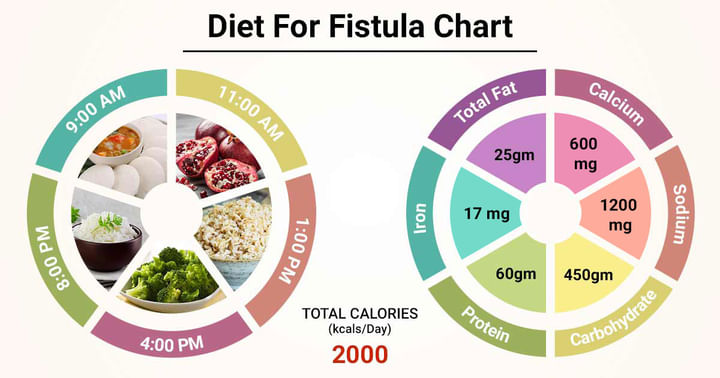Diet Chart For fistula
Last Updated: Jan 20, 2025
About
Fistula is an abnormal medical condition wherein two or more tissues in the body are connected. Most cases of fistula demand immediate medical attention. However, in less intense case, if diagnosed at an early stage, it can be cured by proper diet which includes the required nutrients. The quantity to be taken, frequency and the level of sincerity towards the diet would depend on the nature of fistula, its stage and the metabolism of human body. This varies from person to person as no two individuals can have the same carbon copy of a medical problem.
A diet for fistula include:
- Electrolytes and fluids
- Enteral nutrients
- Parental nutrients
The problem associated with fistula is that in most cases, the area turns out to be highly infected. This leads to heavy fluid drainage from the body. This can be countered by increasing intake electrolytes and fluids to keep the body hydrated and provide it the stamina to fight the disease. Enteral nutrients will help decrease the risk of malnutrition and improve the chances of recovery. Parental nutrients help the body to rest and heal as it has to break down and digest food.
Diet Chart
| Sunday | |
| Breakfast (8:00-8:30AM) | 4 Idly+ 1/2 cup sambhar+1 tsp coconut chutney+1 glass milk/ 1 cup tea |
| Mid-Meal (11:00-11:30AM) | 1/2 cup pomegranate seeds |
| Lunch (2:00-2:30PM) | 1 cup brown rice+2 roti+1/2 cup cabbage dal+1/2 cup capsicum sabji+1 glass buttermilk |
| Evening (4:00-4:30PM) | 1/2 cup boiled broccoli and cauliflower salad with pepper powder and 1 tsp olive oil |
| Dinner (8:00-8:30PM) | 3 roti/ 1 cup parboiled rice+1/2 cup ridge gourd sabji+1 glass buttermilk |
| Monday | |
| Breakfast (8:00-8:30AM) | 1/2 cup Oats in 1 glass milk |
| Mid-Meal (11:00-11:30AM) | 6-7 strawberries |
| Lunch (2:00-2:30PM) | 4 roti+100gm fish(tuna/sardine/salmon/mackerel with little olive oil)-grilled/stewed+1/2 cup rajmah curry |
| Evening (4:00-4:30PM) | 1/2 cup of boiled bengal gram sprouts with tomato, onion and corriander |
| Dinner (8:00-8:30PM) | 3 multi grain roti (jowar, bajra, wheat)/ 1 cup parboiled rice+1/2 cup ivy gourd sabji+1 glass buttermilk |
| Tuesday | |
| Breakfast (8:00-8:30AM) | 3 dosa (ragi + wheat) +1/2 cup sambhar+1tsp methi chutney+1 glass milk/ 1 cup tea |
| Mid-Meal (11:00-11:30AM) | 20 no. green grapes |
| Lunch (2:00-2:30PM) | 1 cup brown rice+2 jowar roti+1/2 cup tomato dal+1/2 cup cluster beans curry+1 glass buttermilk |
| Evening (4:00-4:30PM) | 1 small fist of peanuts,raisins,almonds,walnuts+1 cup green tea |
| Dinner (8:00-8:30PM) | 3 roti/ 1 cup parboiled rice+1/2 cup bhindi sabji+1 glass buttermilk |
| Wednesday | |
| Breakfast (8:00-8:30AM) | Toasted whole wheat bread(3-4 slices) with butter+1 glass milk/1 cup tea |
| Mid-Meal (11:00-11:30AM) | 1 banana |
| Lunch (2:00-2:30PM) | 4 bajra roti+1/2 cup lauki dal+1/2 cup green peas and capsicum sabji+1 glass buttermilk |
| Evening (4:00-4:30PM) | 1/2 cup of stewed tuna and leek salad+1 cup green tea |
| Dinner (8:00-8:30PM) | 3 multigrain roti (bajra, oats, ragi)/ 1 cup parboiled rice+1/2 cup snake gourd sabji+1 glass buttermilk |
| Thursday | |
| Breakfast (8:00-8:30AM) | 1.5 cup parboiled lemon rice+2 tsp tomato chutney+1 glass milk/1 cup tea |
| Mid-Meal (11:00-11:30AM) | 100 gm chopped muskmelon |
| Lunch (2:00-2:30PM) | 1 cup brown rice+2 bajra roti+1/2 cup methi dal+1/2 cup french beans sabji+1 glass buttermilk |
| Evening (4:00-4:30PM) | 1/2 cup of beetroot, carrot and broccoli salad with 1 tsp olive oil |
| Dinner (8:00-8:30PM) | 3 roti/ 1 cup parboiled rice+1/2 cup bittergourd sabji+1 glass buttermilk |
| Friday | |
| Breakfast (8:00-8:30AM) | 2 paratha(aloo/gobhi/methi) with 2 tsp green chutney+1 glass milk/ 1 cup tea |
| Mid-Meal (11:00-11:30AM) | 1 apple |
| Lunch (2:00-2:30PM) | 1 cup white rice+2 roti+100gm fish(tuna/sardine/salmon/mackerel) curry+1/2 cup soya chunk and aloo sabji |
| Evening (4:00-4:30PM) | 1/2 cup of boiled green gram sprouts with tomato, onion and corriander |
| Dinner (8:00-8:30PM) | 3 multi grain roti (corn flour, wheat, oats)/ 1 cup parboiled rice+1/2 cup lauki sabji+1 glass buttermilk |
| Saturday | |
| Breakfast (8:00-8:30AM) | 1 cup dalia upma with vegetables (carrot, tomato, green peas, onion, potato)+1 glass milk/ 1 cup tea |
| Mid-Meal (11:00-11:30AM) | 1 wedge of water melon |
| Lunch (2:00-2:30PM) | 4 roti+1/2 cup palak dal+1/2 cup bitter gourd sabji+1 glass buttermilk |
| Evening (4:00-4:30PM) | 1/2 cup of spring onion, carrot and celery salad |
| Dinner (8:00-8:30PM) | 3 roti/ 1 cup parboiled rice+1/2 cup cauliflower sabji+1 glass buttermilk |
Food Items To Limit
- It is advised to avoid food products with caffeine when having fistula as it can lead to dehydration and loss of water from the body. This includes food items such as tea, coffee, chocolates etc. This can be switched with options such as herbal tea or lemon juice with honey. Alcohol intake should be restricted with fistula, as it can also cause dehydration leading to hard stools.
- It is recommended to avoid refined food and also fatty and fried food when suffering from fistula; and include more of fresh fruits and vegetables in the diet.
- Avoid soft drinks and food products comprising of white flour.
- With fistula, it is important to avoid food products that do not break down easily in the digestive tract such as corn, seeds, skinned food, certain variety of nuts etc.
- Avoid food products that are hard on the digestive system, such as food products with high sugar content, sweeteners, corn syrup with high fructose content etc.
- Heavy dairy products should be avoided, especially for a week or 2 post surgery for fistula.
- Gluten products should be taken in moderation. This is because gluten is a large protein and it is hard to break to down. Needless to mention, gluten products should be strictly avoided by patients with gluten sensitivity and celiac disease.
- It is best to avoid hot and spicy food as it may worsen the problem of fistula and can increase the discomfort and irritation while defecation.
- It is wise to avoid diuretics, as they drain out fluid from the body.
- When suffering from fistula, it is advised to follow a routine and avoid late night dinner and eating out as it may affect the digestion pattern, which in turn may affect the bowel movement. One should also avoid large and heavy meals and stick to smaller, frequent meals in order to reduce the load of digestion.
- It is also important to avoid stress at work and home as this may worsen the condition and causes indigestion.
Do's And Dont's
Do's:
- Eat different coloured fresh vegetables and fruits.
- Eat whole grains instead of refined foods.
- Drink plenty of liquids.
- Use clean and hygiene dresses to avoid infection.
- To reduce the inflammation take omega-3 rich fatty fishes.
Don'ts:
- Don't have heavy meals at once.
- Never sleep immediately after a heavy meal.
- Avoid spicy and salty foods.
- Never stop your urge to defecate.
- Never drink much water with meals.
- Don't use cleaning agents in the effected region too often.
Food Items You Can Easily Consume
- Cereals: Brown rice, Oat meal, Brocken wheat, Ragi, Quinoa.
- Pulses: Chickpeas, Kidney beans, moong dal, masoor dal, soybeans.
- Vegetables: All gourds-bitter gourd, snake gourd, ridge gourd, bottle gourd, ivy gourd, ladies finger, tinda,green leafy vegetables.
- Fruits: Custard Apple, Pears, Grape and Watermelon, Oranges and Apple.
- Milk and Milk products: Skim milk, Paneer, Cotage Cheese, Yoghurt.
- Meat, Fish and Egg: Tuna, Salmon, Herring, Mackerel.
- Oil:
- 5 Tbsp/ day( Olive oil, Mustard Oil, Rice bran Oil, Canola oil
- Sugar: 1 Tsp/ day.
References
- Olson KC. Diet sample collection by esophageal fistula and rumen evacuation techniques. Rangeland Ecology & Management/Journal of Range Management Archives. 1991 Sep 1;44(5):515-9.
- Deitel M. Elemental diet and enterocutaneous fistula. World journal of surgery. 1983 Jul 1;7(4):451-4.
- Grundy DJ. Small bowel fistula treated with low-residue diet. British medical journal. 1971 May 29;2(5760):531.
Table of content
Find Dietitian/Nutritionist near me
Ask a free question
Get FREE multiple opinions from Doctors



